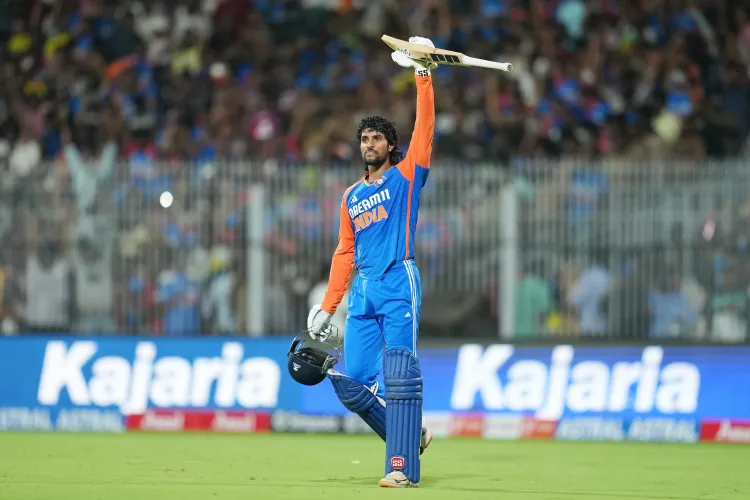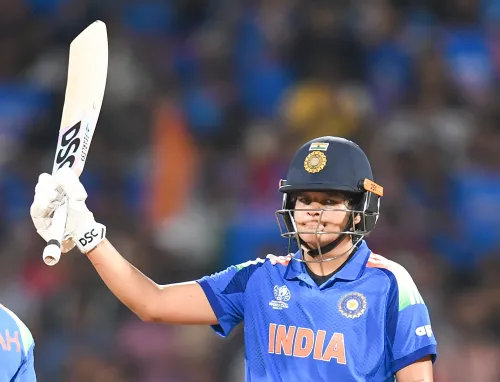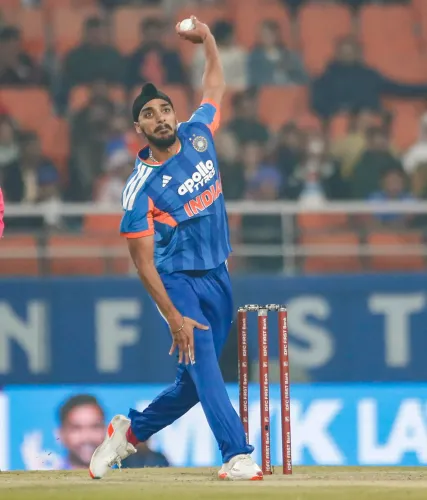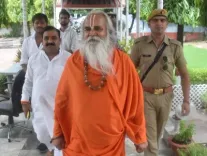Tilak Varma: My Mindset Was to Finish the Game

Synopsis
Key Takeaways
- Tilak Varma scored 72 not out in challenging conditions.
- India was reduced to 78/5 and 126/7 during the chase.
- Key advice from Gautam Gambhir stressed the significance of finishing the innings.
- Tilak emphasized working on his strike rate for better performance.
- Team dynamics with Arshdeep Singh and Ravi Bishnoi were crucial in the final overs.
New Delhi, Jan 26 (NationPress) After his match-winning performance of 72 not out, which propelled India to a 2-0 lead in the ongoing series against England, India's top-order batsman Tilak Varma shared his thoughts on the high-pressure final overs of the chase. He mentioned that he was determined to play until the end and secure the victory.
While chasing a target of 166 at MA Chidambaram Stadium, India found themselves in a precarious position at 78/5 and later 126/7. However, Tilak managed to remain resilient, scoring an impressive 72 not out off 55 balls, featuring four boundaries and five sixes. His exceptional performance helped India clinch the victory with four balls remaining in the match, giving them a commanding 2-0 lead in the five-match series.
"Gautam sir advised me in the previous innings that when you're looking at needing 10 runs per over, it’s possible to achieve that. When the requirement is around 7-8 runs, your role becomes crucial. Thus, it’s important to stay till the end. Regardless of how you play, let the non-striker score. Your task is to secure one or two boundaries per over and take singles," he explained.
“If you remain until the end, we will win the game. He reminded me of this in the last match as well. Even today, during the drinks break, he emphasized the need to play till the very end. Therefore, I kept it in my mind that I would play till the end. I believed that I could win the match,” Tilak stated during the post-match interview with Star Sports.
In recent T20I matches, Tilak has showcased remarkable form, including back-to-back centuries during last year's tour of South Africa. "I’ve focused on improving my strike rate. My forward game has developed well. If I can connect on the pick-up shot or the bouncer, it puts significant pressure on the bowler. Therefore, I’ve dedicated a lot of effort to this. My strike rate has improved, and it's evident that I'm achieving positive results," he added.
The left-handed batsman also shared his mindset while wickets fell at the other end, as well as his thought process while pairing with Arshdeep Singh and Ravi Bishnoi, who contributed key boundaries in the successful run chase. "Honestly, I was under a lot of pressure. Arshdeep kept saying, 'I will hit it. I will hit it. I need to give a single.' My thought was that on this pitch, Archer couldn’t get you out. On this surface, Adil Rashid would be effective because his deliveries were moving significantly."
“I understood that Arshdeep would attempt to target the spinner. I told him, 'No, bhai.' If Arshdeep wanted to play, he should face Archer. He mentioned he wouldn’t face Archer, so I said, 'Alright, I will take that on.' I advised him to be prepared with his defense. 'Whether it’s a bouncer or not, you just need to defend. If you see him behind, bend down.' I’m not sure what he ended up doing.
“He said, 'If I get a bouncer, I’ll hit it over.' He spoke a lot. However, I’m pleased he managed to score a boundary off Archer. The highlight was witnessing Ravi Bishnoi's batting. He has been performing exceptionally well in the nets. He and Varun Chakravarthy executed their batting brilliantly. I had great faith in both of them that they could contribute effectively.”
“I told them, 'If you’re looking to hit, aim for the gaps. If you can secure a single, that’s not an issue. If you want to position yourself for the bouncer, consider it like Test cricket.' Ultimately, Ravi Bishnoi played admirably. Notably, he executed a flick shot that was crucial. A lot of credit goes to him as well. Those two boundaries were indeed very significant," he concluded.










